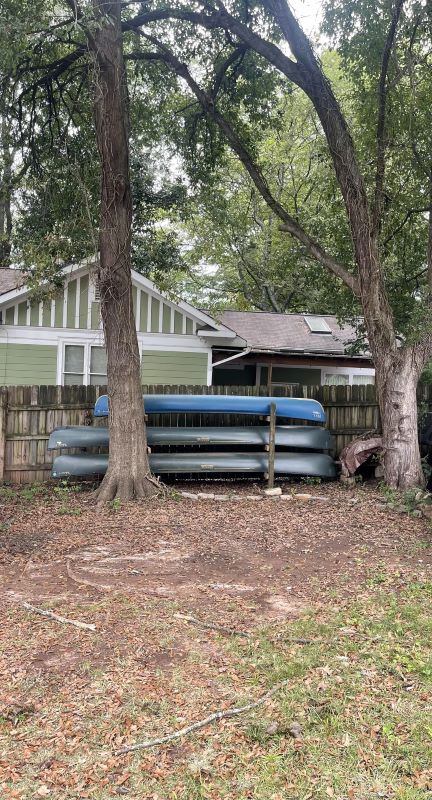A homeowner's dilemma about gravel and oak trees has ignited an unexpected eco-friendly-lawn movement on Reddit. This online discussion is opening eyes to the broader implications of seemingly harmless yard care choices.
The original poster shared a photo of their predicament — an area below two trees where grass won't grow — to the r/arborists subreddit and asked, "Will I hurt the oak tree by adding gravel?"

"I park under this oak and Bradford pear tree every day and it's a muddy mess when it rains," they wrote above the picture. "Grass won't grow under it and it's shaded all summer by the trees. If I add gravel where the mud is will it be bad for the oak?"
This seemingly simple question opened the floodgates to discussions about sustainable landscaping practices.
Experts warn that gravel can lead to soil compaction and trap heat, potentially harming tree roots. These insights have led to a broader conversation about the hidden environmental costs of common landscaping solutions.
The debate highlights a growing trend of homeowners seeking eco-friendly alternatives to traditional lawns. These choices not only protect trees but also have significant impacts on both consumers and the environment.
Water Conservation: Native and drought-resistant plants can dramatically reduce water usage, lowering utility bills for homeowners and reducing strain on local water resources.
Reduced Maintenance: Low-maintenance lawns mean less time spent mowing and fewer chemicals needed, saving homeowners money and reducing pollution from lawn equipment and pesticides.
Increased Biodiversity: Native plant lawns create habitats for local wildlife, including crucial pollinators, contributing to healthier local ecosystems. You can also use grass alternatives, such as clover or buffalo grass, to green up your lawn.
🗣️ What's the hardest thing about taking care of your yard?
🔘 Mowing the lawn 🏡
🔘 Controlling weeds 🌿
🔘 Keeping pests at bay 🐿️
🔘 I don't have a yard 🤷
🗳️ Click your choice to see results and speak your mind
Pollution Reduction: Plants with deeper root systems, like many native species, can sequester more carbon than traditional grass lawns, helping in the fight against rising global temperatures.
Improved Soil Health: Diverse plant life and reduced chemical use lead to healthier soil, which can better absorb rainwater and reduce runoff and erosion.
Commenters flooded the post with interest in sustainable landscaping. "Native plants are adapted to local conditions and require less maintenance. Plus, they create a healthier pollinator ecosystem, which ultimately benefits our food supply!" wrote one user.
Another user shared their success story: "I switched to a clover lawn last year, and it's been a game-changer. Lower water bills, less mowing, and it stays green even in drought conditions. My kids love looking for four-leaf clovers too!"
They had plenty to say in answer to the OP's question, too.
"Add mulch, not gravel. Gravel is horrible for trees and wouldn't solve the issue long term anyway," one user wrote.
"Cut the Bradford pear tree down, put it through a wood chipper, and use it to mulch around the oak," another said, hitting on the fact that the Bradford Pear is an invasive species.
The Reddit thread turned a simple question about gravel into a catalyst for rethinking our relationship with our yards. It shows that small changes in our immediate environment, such as switching to a natural lawn, can have ripple effects that can benefit our communities, our wallets, and the planet.
Join our free newsletter for easy tips to save more and waste less, and don't miss this cool list of easy ways to help yourself while helping the planet.









